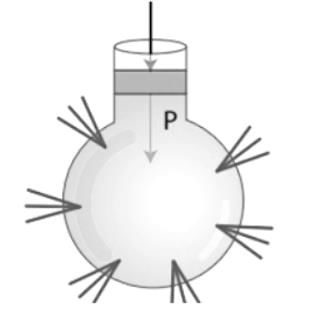EmSAT Achieve Exam > EmSAT Achieve Questions > As per Pascal’s law:a)intensity of pres...
Start Learning for Free
As per Pascal’s law:
- a)intensity of pressure at a point in a moving fluid is equal in the direction of applied force.
- b)intensity of pressure at a point in a static fluid is equal in all directions.
- c)intensity of pressure at a point in a moving fluid is equal in all directions
- d)intensity of pressure at a point in a static fluid is equal in the direction of applied force.
Correct answer is option 'B'. Can you explain this answer?
Verified Answer
As per Pascal’s law:a)intensity of pressure at a point in a movi...
Concept:
- Pascal’s principle: Pascal’s Law is the principle of transmission of fluid-pressure.
- It says that "a pressure exerted anywhere in a point of the confined fluid is transmitted equally in all directions throughout the fluid”.

EXPLANATION:
- Centrifuge: Centrifugation is used to separate the contents of mixtures according to their size and density. The centrifuge works on the principle of sedimentation.
- Hydraulic Lift: The lift that uses pascal's law and used to lift objects with the help of fluid is called hydraulic lift. It works on Pascal's law. So option 2 is correct.
- Motor: A motor is an electrical device that converts electrical energy into mechanical energy. It works on the principle that a current-carrying conductor experiences a mechanical force when it is placed in a magnetic field.
- Lever: A lever is a simple machine that is made up of two load arms and a fulcrum. The distance from the fulcrum can be used to determine how the input and output forces are related to each other.
Most Upvoted Answer
As per Pascal’s law:a)intensity of pressure at a point in a movi...
Explanation:
Pressure in a static fluid is equal in all directions according to Pascal's law. This means that the pressure at a point in a fluid is transmitted undiminished in all directions throughout the fluid.
Key Points:
- Pascal's law states that pressure applied to a confined fluid is transmitted undiminished in every direction throughout the fluid.
- In a static fluid, the pressure at a point is the same in all directions because the fluid is not moving.
- This is why option 'B' is the correct answer to the question based on Pascal's law.
Pressure in a static fluid is equal in all directions according to Pascal's law. This means that the pressure at a point in a fluid is transmitted undiminished in all directions throughout the fluid.
Key Points:
- Pascal's law states that pressure applied to a confined fluid is transmitted undiminished in every direction throughout the fluid.
- In a static fluid, the pressure at a point is the same in all directions because the fluid is not moving.
- This is why option 'B' is the correct answer to the question based on Pascal's law.

|
Explore Courses for EmSAT Achieve exam
|

|
Question Description
As per Pascal’s law:a)intensity of pressure at a point in a moving fluid is equal in the direction of applied force.b)intensity of pressure at a point in a static fluid is equal in all directions.c)intensity of pressure at a point in a moving fluid is equal in all directionsd)intensity of pressure at a point in a static fluid is equal in the direction of applied force.Correct answer is option 'B'. Can you explain this answer? for EmSAT Achieve 2025 is part of EmSAT Achieve preparation. The Question and answers have been prepared according to the EmSAT Achieve exam syllabus. Information about As per Pascal’s law:a)intensity of pressure at a point in a moving fluid is equal in the direction of applied force.b)intensity of pressure at a point in a static fluid is equal in all directions.c)intensity of pressure at a point in a moving fluid is equal in all directionsd)intensity of pressure at a point in a static fluid is equal in the direction of applied force.Correct answer is option 'B'. Can you explain this answer? covers all topics & solutions for EmSAT Achieve 2025 Exam. Find important definitions, questions, meanings, examples, exercises and tests below for As per Pascal’s law:a)intensity of pressure at a point in a moving fluid is equal in the direction of applied force.b)intensity of pressure at a point in a static fluid is equal in all directions.c)intensity of pressure at a point in a moving fluid is equal in all directionsd)intensity of pressure at a point in a static fluid is equal in the direction of applied force.Correct answer is option 'B'. Can you explain this answer?.
As per Pascal’s law:a)intensity of pressure at a point in a moving fluid is equal in the direction of applied force.b)intensity of pressure at a point in a static fluid is equal in all directions.c)intensity of pressure at a point in a moving fluid is equal in all directionsd)intensity of pressure at a point in a static fluid is equal in the direction of applied force.Correct answer is option 'B'. Can you explain this answer? for EmSAT Achieve 2025 is part of EmSAT Achieve preparation. The Question and answers have been prepared according to the EmSAT Achieve exam syllabus. Information about As per Pascal’s law:a)intensity of pressure at a point in a moving fluid is equal in the direction of applied force.b)intensity of pressure at a point in a static fluid is equal in all directions.c)intensity of pressure at a point in a moving fluid is equal in all directionsd)intensity of pressure at a point in a static fluid is equal in the direction of applied force.Correct answer is option 'B'. Can you explain this answer? covers all topics & solutions for EmSAT Achieve 2025 Exam. Find important definitions, questions, meanings, examples, exercises and tests below for As per Pascal’s law:a)intensity of pressure at a point in a moving fluid is equal in the direction of applied force.b)intensity of pressure at a point in a static fluid is equal in all directions.c)intensity of pressure at a point in a moving fluid is equal in all directionsd)intensity of pressure at a point in a static fluid is equal in the direction of applied force.Correct answer is option 'B'. Can you explain this answer?.
Solutions for As per Pascal’s law:a)intensity of pressure at a point in a moving fluid is equal in the direction of applied force.b)intensity of pressure at a point in a static fluid is equal in all directions.c)intensity of pressure at a point in a moving fluid is equal in all directionsd)intensity of pressure at a point in a static fluid is equal in the direction of applied force.Correct answer is option 'B'. Can you explain this answer? in English & in Hindi are available as part of our courses for EmSAT Achieve.
Download more important topics, notes, lectures and mock test series for EmSAT Achieve Exam by signing up for free.
Here you can find the meaning of As per Pascal’s law:a)intensity of pressure at a point in a moving fluid is equal in the direction of applied force.b)intensity of pressure at a point in a static fluid is equal in all directions.c)intensity of pressure at a point in a moving fluid is equal in all directionsd)intensity of pressure at a point in a static fluid is equal in the direction of applied force.Correct answer is option 'B'. Can you explain this answer? defined & explained in the simplest way possible. Besides giving the explanation of
As per Pascal’s law:a)intensity of pressure at a point in a moving fluid is equal in the direction of applied force.b)intensity of pressure at a point in a static fluid is equal in all directions.c)intensity of pressure at a point in a moving fluid is equal in all directionsd)intensity of pressure at a point in a static fluid is equal in the direction of applied force.Correct answer is option 'B'. Can you explain this answer?, a detailed solution for As per Pascal’s law:a)intensity of pressure at a point in a moving fluid is equal in the direction of applied force.b)intensity of pressure at a point in a static fluid is equal in all directions.c)intensity of pressure at a point in a moving fluid is equal in all directionsd)intensity of pressure at a point in a static fluid is equal in the direction of applied force.Correct answer is option 'B'. Can you explain this answer? has been provided alongside types of As per Pascal’s law:a)intensity of pressure at a point in a moving fluid is equal in the direction of applied force.b)intensity of pressure at a point in a static fluid is equal in all directions.c)intensity of pressure at a point in a moving fluid is equal in all directionsd)intensity of pressure at a point in a static fluid is equal in the direction of applied force.Correct answer is option 'B'. Can you explain this answer? theory, EduRev gives you an
ample number of questions to practice As per Pascal’s law:a)intensity of pressure at a point in a moving fluid is equal in the direction of applied force.b)intensity of pressure at a point in a static fluid is equal in all directions.c)intensity of pressure at a point in a moving fluid is equal in all directionsd)intensity of pressure at a point in a static fluid is equal in the direction of applied force.Correct answer is option 'B'. Can you explain this answer? tests, examples and also practice EmSAT Achieve tests.

|
Explore Courses for EmSAT Achieve exam
|

|
Signup for Free!
Signup to see your scores go up within 7 days! Learn & Practice with 1000+ FREE Notes, Videos & Tests.


















